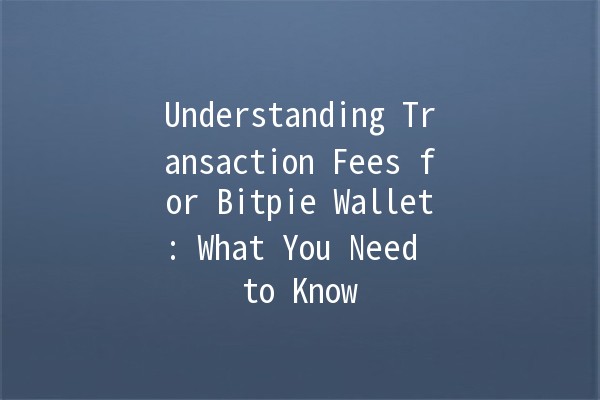




In the everevolving world of cryptocurrencies, managing your digital assets effectively is paramount. With numerous wallets available, the Bitpie Wallet stands out for its userfriendly interface and robust security features. However, one critical aspect users must thoroughly understand is transaction fees. How does Bitpie Wallet handle these fees, and what should you know to enhance your crypto experience? Let’s dive into it!
Bitpie Wallet is a versatile cryptocurrency wallet that supports various digital assets, including Bitcoin, Ethereum, and many altcoins. As a noncustodial wallet, Bitpie prioritizes security, allowing users to control their private keys while enabling seamless access to the crypto ecosystem. One of the essential features of any crypto wallet is its transaction fees, which can impact your trading strategies and overall profitability.

Transaction fees in the cryptocurrency world refer to the charge a user pays to conduct transactions on a blockchain network. These fees are essential for incentivizing miners or validators to process and confirm transactions. In the case of Bitpie Wallet, understanding how these fees work is crucial for effective financial planning.
Transaction fees can vary significantly based on network congestion, the type of transaction, and the chosen wallet. High fees during peak times can deter users from executing trades. Therefore, understanding how to estimate and manage these costs is vital for efficient crypto trading and transferring.
Bitpie Wallet offers users a transparent way to calculate transaction fees. Here’s how you can understand the fee structure better:
Bitpie Wallet dynamically adjusts transaction fees based on the current state of the blockchain. When a network is congested, fees will rise to ensure timely transactions. Conversely, during low activity periods, fees may decrease.
Example: If Bitcoin's network is experiencing high traffic due to a major price surge, the transaction fees might spike to prioritize confirmations. Users can choose to wait for better fee conditions or pay the higher fee to expedite their transactions.
Bitpie allows users to set their transaction fees. When initiating a transfer, users can select how quickly they want their transaction processed, giving them control over the fee they are willing to pay.
Example: If you want your transaction to be confirmed within ten minutes, you can set a higher fee compared to a transaction that you are okay with taking an hour.
Managing transaction fees can enhance your trading experience. Here are five practical tips that Bitpie users can implement:
Keeping an eye on the current state of the blockchain can help you determine the right time to execute transactions. Websites like Bitcoinfees.earn.com provide realtime data on average fees.
Application: Use this data to time your transactions during offpeak hours.
Take advantage of Bitpie’s ability to adjust fee settings when sending transactions. If the fee is too high for your liking, consider delaying the transaction or adjusting the fee settings to a more appropriate level.
Example: For nonurgent transactions, setting a lower fee can save money.
Market volatility often correlates with network traffic. Watching price trends of cryptocurrencies can help you make informed decisions about when to transfer crypto.
Example: If you're anticipating an increase in Bitcoin's price, consider transferring funds before the network congestion increases to avoid higher fees.
If you need to send multiple transactions, consider batching them into one transaction where possible. Bitpie Wallet may allow you to combine fees, making it a more costeffective method.
Example: Instead of sending five small transactions, combine them into a single transaction with a higher amount, which can reduce the overall fee.
Participate in forums and social media groups focused on cryptocurrency and Bitpie Wallet. Engaging with the community can provide insights into best practices for managing fees and optimizing your wallet use.
Example: Users might share their experiences with recent fee alterations, helping you gauge when to make your transactions.
Various factors affect transaction fees, including network congestion, selected transaction speed, and the specific cryptocurrency being used. Each wallet's settings also play a role, as users have the option to set their transaction fees based on their preferences.
While it’s not possible to eliminate transaction fees entirely when using blockchain networks, you can minimize fees by choosing the right time to send transactions or taking advantage of lower network activity periods.
No, transaction fees in Bitpie Wallet are not fixed and can fluctuate based on network conditions. Users should remain vigilant about changes and monitor recommended fee ranges before finalizing transactions.
Bitpie Wallet offers competitive transaction fees compared to other wallets. However, it’s essential to assess the fee structures of different wallets as they can vary widely based on features and network priorities.
Typically, transaction fees are nonrefundable, even if a transaction fails. It’s critical to doublecheck transaction details before submitting to avoid unnecessary costs.
It’s advisable to check transaction fees regularly, especially during periods of market volatility or significant events in the cryptocurrency space. Setting alerts or reminders can help you stay informed.
Understanding and managing transaction fees in Bitpie Wallet is essential for optimizing your cryptocurrency experience. By implementing effective strategies and staying informed about network conditions, users can enhance their financial outcomes in the crypto world. With tools at your disposal and practical tips, navigating transaction fees becomes a more manageable task, empowering you to make informed decisions on your digital asset management journey.
Incorporating these practices ensures a smoother experience as you transact with Bitpie. As the world of cryptocurrency continues to evolve, staying informed and adaptable will lead to more successful transactions and investment strategies.